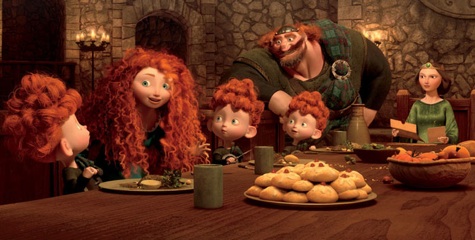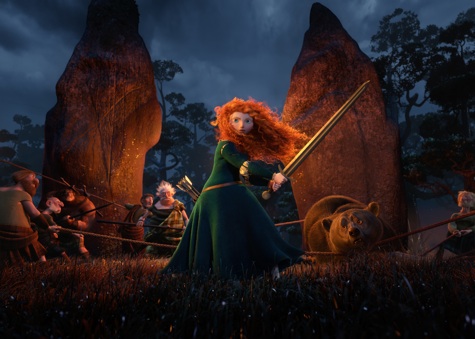Brave should have had a different name.
I’m not saying that the film was an utter disaster… merely that they may have employed a misnomer in service of their title. The film is not really about bravery at all. A better title might have been “Changing Fate” or “Mother’s Love.” But then people probably wouldn’t have wanted to see it, so Brave was likely the right way to go.
SPOILERS BEYOND.
Brave joins a fine legacy of Pixar films, and has the distinction of being their first go with a female protagonist. This was long overdue, and as a result, fans have been holding their breath a bit over this one. So how did it fare? Well, it was beautiful at moments, that’s for sure.
The animation continues to go leaps and bounds beyond anyone’s imagination. The level detail in Brave, the broad sweeping landscape shots of the Scottish Highlands and the texture of fur, hair and fabric are dazzling. For that alone, the film is worth note, but its portrayal of the Scottish people leaves a lot to be desired in its wake: according to Brave, Scottish people are very opinionated and boisterous. They spend most of their time bickering, brawling, or drinking. Considering how well Up handled Russell’s Asian heritage (by not ladening the character with cultural stereotypes), this rather rote take on Scottish culture seemed hamfisted at the best of times, even when it was funny. The soundtrack was gorgeous, except when songs came into play. The English songs overlaid onto the action were chock full of lame lyrics about heart, freedom and wind, or whatever. Pixar proved that they understood the value of silence in Wall-E. It’s too bad they neglected it this time around.

The crux of the film is simple—Princess Merida is a free sort of spirit who wants to spend her time riding, shooting arrows, and generally having adventures. She has some fantastic ginger curls and a hard time listening to her mother, who wants her to be a perfect princess. Things get worse when its time for Merida to be betrothed to a lord’s son from the kingdom. Merida and her mother are suffering from the thing that mothers and daughters often suffer from when girls grow up: they don’t listen to each other. As a result, the princess consults a witch who gives her a spell to change her fate. It will change her fate by changing her mother…
…into a bear.
This particular aspect of the film is pure, varnished genius. Merida is not expecting this little side effect, of course, and the result leaves her and her mother on the run. An adventure between a mother and daughter? And mom is a giant freaking bear? Beauty and Beast just got 107% more interesting. And meaningful.
But there are problems surrounding the conceit—the overall betrothal arc takes far too long to set up, and could really be done away with entirely. In fact, the fight between Merida and her mother being due to a required marriage makes the story awfully dated and serves no real function in the telling; Merida is clearly too young to be married, and the misunderstandings she constantly faces with her mother could have easily been caused by her ignoring her upcoming responsibilities as a ruler of the kingdom instead. When the queen finally concedes that her daughter should marry for love, it’s wonderful… because it means that Merida won’t have to get married. But if this journey was created to build understanding between them, then it makes little sense, since Merida was never complaining that she didn’t get to marry for love in the first place. She simply doesn’t want to be married. (Novel idea, right?)
Other missteps seem to be the result of the filmmakers inserting their brand of “guy humor” into the plotline, but the tale doesn’t need that sort of pandering. Merida’s brothers don’t actually make the movie any better; they’re silly and cute, but they they lack individual characters, and serve primarily to push the plot when it needs pushing. All the drinking and fighting sends a bad sort of “boys will be boys” message, and suggests that it’s up to women to rise above that sort of behavior. In a story about a girl who wants freedom to do what she wishes, what we receive is a stifling response.
The actual adventure Merida and her mother face together has practically no time to develop. They quickly figure out what problems they’ll run into if Merida can’t reverse the spell, and they work to do it. It would have been nice if there had been a little more magic involved, a lot more learning to work together, to talk to each other. But the film gives them less that two days to work all this out, and what could have been a whole film of one awesome princess and her big mother bear telling the world what’s what becomes a quick educational outing before it’s back to the palace, stat!
Some other problems lie in age reconciliation, it seems. Brave does what most Pixar films have avoided thus far: slip in adult jokes to amuse while the kiddies are focused elsewhere. One could easily assume that their confusion this time around lay with their protagonist—Merida is a teenager, and the movie is dealing with teenage issues. As a result, the film’s messages are far from universal, and story flip-flops a few times before it smacks the audience with its emotional core.
The story does succeed, and remarkably so, on an emotionally level for one uncomplicated reason: if you have a mother (and especially if you’re a daughter) then this movie was created for you. It’s a tribute to you and your mother, the trials you have overcome together, and will always have to overcome because you’re different from each other. For that, Brave will make you laugh. And cry. And wish you had your mother there to cry on.
It practically is Beauty and the Beast, ultimately, but if the beast is your mom then where does that leave you when the mob comes knocking? Instead of Belle crying out to Gaston to stop, we have a redheaded spitfire with a bow, arrows, and a broadsword, ready to cleave anyone in two who tries to hurt to mother.

Which is a beautiful symmetry. Because it’s exactly what your mother would do for you.
So despite a few misfires (and an awkward title), Brave will still pack the punch you expect from a Pixar film. More than anything, it proves something important—we need more stories about mothers. About mothers and daughters. About mothers and daughters having adventures together.
Or, maybe, we all just need to have more adventures with our mothers.
Emmet Asher-Perrin sadly did not have three wicked little brothers to help her scheme when she was younger. She did have red hair, though. You can bug her on Twitter and read more of her work here and elsewhere.










